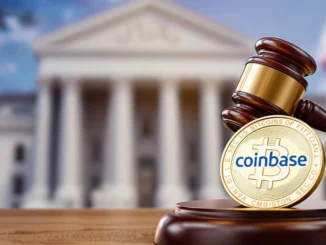
The gloves are off again! Leading cryptocurrency exchange Coinbase is doubling down on its pursuit of transparency, reigniting a significant legal battle with the Federal Deposit Insurance Corporation (FDIC). After a brief pause, the exchange is back in court, demanding access to crucial documents under the Freedom of Information Act (FOIA). Why is Coinbase pushing so hard, and what secrets could these documents reveal about crypto regulation and the FDIC’s stance on digital assets? Let’s dive into this developing story.
Why is the Coinbase FOIA Lawsuit Back in the Spotlight?
For those just catching up, Coinbase initially filed a FOIA lawsuit against the FDIC seeking greater clarity and access to information. The core issue? Coinbase believes the FDIC isn’t being forthcoming with documents that could shed light on how the agency views and regulates cryptocurrency companies. According to Eleanor Terrett, a respected voice in financial journalism, Coinbase alleges that the FDIC is still playing hide-and-seek with vital documents, hindering their ability to understand the regulatory landscape. This lack of FDIC Transparency is a major concern for Coinbase and the broader crypto industry.
The lawsuit was temporarily paused earlier this year when Travis Hill was appointed Acting FDIC Chair by former President Trump. There was hope that new leadership might foster a more cooperative environment and allow for resolution outside the courtroom. Coinbase Chief Legal Officer Paul Grewal acknowledged that while cooperation had improved somewhat, it simply hasn’t gone far enough. The fundamental issue of transparency remains unresolved, pushing Coinbase to resume legal action to ensure Financial Information Access.
What Does Coinbase Hope to Achieve with Increased FDIC Transparency?
So, what’s the big deal about these documents? For Coinbase, and indeed for the entire cryptocurrency ecosystem, understanding the FDIC’s internal communications and policies is paramount. Here’s why this pursuit of FDIC Transparency is so critical:
- Regulatory Clarity: The cryptocurrency industry operates in a relatively new and often ambiguous regulatory environment. Access to FDIC documents could provide crucial insights into how regulators perceive and plan to oversee digital assets.
- Level Playing Field: Transparency ensures that all players in the financial industry, including crypto exchanges, are treated fairly and have equal access to regulatory information.
- Risk Management: Understanding the FDIC’s concerns and perspectives helps cryptocurrency businesses like Coinbase to better manage risks and comply with evolving regulations.
- Building Trust: Openness from regulatory bodies like the FDIC fosters trust and confidence in the financial system, benefiting both traditional and digital finance sectors.
The Roadblocks to Digital Asset Transparency: What’s Holding Up the Information?
The question remains: why is the FDIC seemingly hesitant to fully cooperate with Coinbase’s information requests? While the specifics are still unfolding, several potential factors could be at play:
| Potential Roadblock | Possible Explanation |
|---|---|
| Bureaucratic Processes | Government agencies often have complex internal procedures for handling FOIA requests, which can lead to delays and incomplete responses. |
| Confidentiality Concerns | The FDIC might be concerned about releasing information that it deems confidential or sensitive, even under FOIA. |
| Differing Interpretations of FOIA | Coinbase and the FDIC may have different interpretations of what constitutes a valid FOIA request and what information is legally required to be disclosed. |
| Regulatory Uncertainty | The evolving nature of Crypto Regulation itself might contribute to the FDIC’s cautious approach, as they navigate the complexities of digital asset oversight. |
What’s Next for the Coinbase FOIA Lawsuit and Crypto Regulation?
The immediate next step is for the FDIC to respond to Coinbase’s motion within two weeks. This response will likely indicate the FDIC’s stance and whether they are willing to further cooperate or continue to resist the information requests. The court’s decision on resuming the lawsuit will be pivotal.
This Coinbase FOIA Lawsuit has broader implications for the cryptocurrency industry. It underscores the ongoing tension between innovation in the digital asset space and the need for regulatory oversight and Crypto Regulation. The outcome of this case could set a precedent for future interactions between crypto companies and regulatory bodies, particularly concerning Digital Asset Transparency and information sharing.
Actionable Insights: What Does This Mean for You?
Whether you are a crypto investor, a blockchain enthusiast, or simply someone interested in the future of finance, this case is worth watching closely. Here’s why:
- Stay Informed: Follow updates on the Coinbase FOIA lawsuit and related developments in crypto regulation.
- Transparency Matters: Support initiatives that advocate for greater transparency from regulatory bodies in the crypto space.
- Understand Regulatory Risks: Be aware that regulatory uncertainty remains a significant factor in the cryptocurrency market.
- Engage in Dialogue: Participate in discussions about responsible crypto regulation and the importance of open communication between the industry and regulators.
Conclusion: The Fight for Transparency in the Digital Age
Coinbase’s renewed push for Financial Information Access through the FOIA lawsuit is a bold move that highlights the critical need for transparency in the rapidly evolving world of cryptocurrency. As the digital asset landscape matures, open communication and clear regulatory frameworks are essential for fostering innovation, building trust, and ensuring the responsible growth of the crypto industry. The world is watching to see if this legal battle will finally unlock the doors to greater FDIC transparency and pave the way for a more collaborative future between crypto and regulators.



